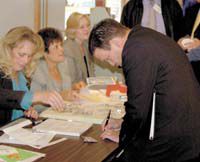| Jason Perry, director of the Governor’s Office of Economic Development (GOED) signs at the start of Friday’s third annual Castle Country Economic Summit. Perry delivered the afternoon’s keynote address to summit attendees at the Museum of the San Rafael in Castle Dale. |
The Castle Valley Economic Summit took place last Friday in Castle Dale.
The summit, which is sponsored by local businesses and organized by economic development entities in Carbon and Emery counties, has become a watershed event for the small business community in Castle Country.
The economic summit started Friday morning with regional Rocky Mountain Power community manager Debra Dull introducing Reginald Soepnel as the director of the Hunter and Huntington plants.
Soepnel spoke briefly of what he sees in the future for Rocky Mountain Power and the company’s three electrical generation plants that dot the Castle Valley region.
The breakfast keynote address was given by Patrick Malone.
He was selected to speak because of extensive teaching, research and management experience in city planning, civic entrepreneurship and community design.
Malone is employed as a business, community and economic development specialist with the Partnership for Rural Improvement through Washington State University Extension and Community Colleges of Spokane.
He also has 15 years of experience in various legislative, executive policy and program administrator positions.
Malone detailed his vision for community based economic development. He used several case models to demonstrate his plan.
Most prominent was the town of Tupelo, Miss., described by Malone as the “best and longest lasting community economic success story” he has witnessed.
According to Malone, the framework for this particular economic development strategy consists of:
•Town building, in which education and technical training are used to cultivate human capital.
•Community building, which consists of weaving together all human and social assets as well as forging trust and leadership.
•Fostering entrepreneurship, which Malone sees as the highest form of community evolution, moving beyond its physical and natural resource capital.
Following the address, the summit adjourned for morning breakout sessions.
The breakouts allowed a summit participant to chose from three different information tracks depending on individualn needs and interests.
Track one focused on developing a small business from the idea stage though writing a business plan and ultimately financing your business.
The sessions were directed by local economic directors Delynn Fielding and Mike McCandless as well as the director of the small business development center (SBDC), Ethan Migliori.
The summit’s second and third tracks featured sessions concerning bio-diesel, the “life elevated” Utah marketing plan, introduction to the Western Energy Training Center, Social Security planning workshops and a market seminar by Zions Bank.
The afternoon keynote address was given by Jason Perry, executive director of the governor’s office of economic development.
The office oversees economic development in the state, the office of tourism and the Utah Film Commission.
Prior to heading the governor’s office of economic development, Perry was deputy director of the Utah Department of Commerce.
Perry’s address detailed the plan the governor’s office has for promoting entrepreneurship in rural Utah.
A theme that was prevalent in Malone’s and Perry’s presentations was the need to focus on retaining and expanding local business from within.
Perry addressed many issues concerning the Castle Valley region and rural Utah.
The issues ranged from the governor’s plan to address fuel costs in Utah to the economic cluster initiative.
The initiative will impact Castle Country as energy and natural resources have been designated as an economic cluster.
The afternoon concluded with the local sessions, which were highlighted by addresses EAO Systems and Clear Sky Wireless.
Malone summed up the spirit of the summit by quoting George McLean, Tupelo Miss.:
“There is no Santa Claus in Salt Lake or Washington, D.C. or anywhere else for our communities. If you want better a community, you will have to do it yourself. If you don’t do it, it will never get done.”

